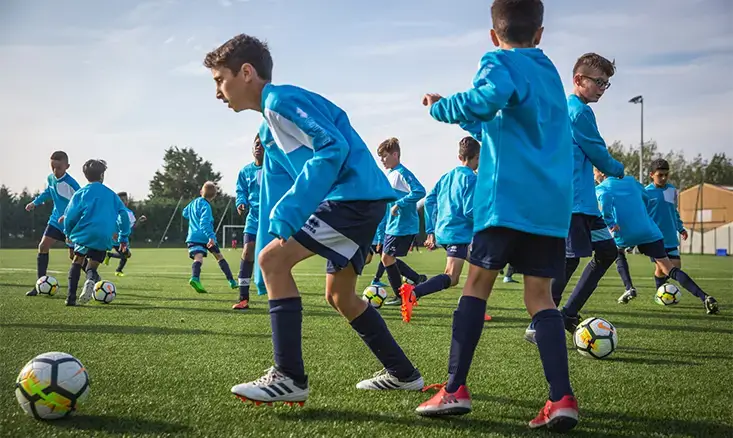The Benefits of Local City Play in Youth Soccer: Reevaluating the Travel Tournament Craze

CRFC BLOGS
LATEST BLOGS & NEWSLETTERS
The Benefits of Local City Play in Youth Soccer:
Reevaluating the Travel Tournament Craze

The Rise of Travel Soccer for Younger Players
Questions for Parents and Players
With this shift towards earlier and more extensive travel soccer, parents and players are confronted with several important questions:
Why is this happening?
Does it make me a better player?
Is it worth the time, money, and effort?
At what age does travel soccer make sense?
To address these questions, we must consider what’s truly in the best interest of the child and player, particularly in cities with robust soccer scenes like Charlotte.
The Flaws of Travel Leagues for Player Development
One of the most significant criticisms of early travel soccer involvement is that it may not be helpful for player development, especially at a young age. Clubs have become adept at separating families from their money and controlling their time. The fear of missing out on future opportunities and success often drives parents to commit to these programs.
Clubs frequently promote the idea that “practicing with better players” is the key to future progress, success, and development. However, it’s essential to remember that these teams typically have a core group of 6 or 7 players, with others subsidizing this small group. While practicing with talented teammates has its merits, there’s no substitute for on-ball skill development, decision-making, competition, and the desire to improve, especially for young children. Sitting in a car to travel a total of 4 to 6 hours for a 70-minute game is not effective in improving a player.

The Travel Soccer Time Drain and Money Drain
Consider the scenario of a 10-year-old traveling two hours each way (four hours round trip) to play a 60- or 80-minute game, not to mention arriving 45 minutes early. This translates to five hours invested in a single match. Additionally, many of these games may not be competitive, and factors like rain can lead to last-minute cancellations, leaving players and parents feeling frustrated.
On the other hand, if you opt to play locally, just 30 minutes away, you can utilize your time more efficiently. Players can scrimmage, practice as a team, engage in private lessons, or even participate in other sports, fostering a more well-rounded sports experience. Multisport participation is shown to reduce injuries and enhance valuable athletic skills. The cost is obvious local vs travel with hotel stay, food, and travel costs.
The Conflict Between Winning Today and Playing for Tomorrow
The larger soccer clubs’ primary focus is often on winning games in the present, while what’s essential to young players is having fun today and playing in game situations. These two objectives can often be in conflict within the current structure of youth travel soccer. Ask a group of players; would you rather win or play? The answer is play. The answer is to play all day every day. At what age should a player play less than 2/3 of a game? After the game most teams are played with a core of 6 to seven players and the rest subsidize the experience. The going Club and team talking point is we want everyone to progress. Winning is not that important. Is this truthfully stated? What do the team and coaches’ actions tell you? Do they match up?

What Age Should a player's team travel for league play?
A Better Approach for Serious Players
For serious players in cities like Charlotte, where there’s a rich soccer culture, a more balanced approach may be the answer. Utilizing local leagues like the “Carolina Champions League” in combination with Charlotte Rise FC can provide the best of both worlds.

Players can participate in the local league and carefully plan and schedule a tournament season to complement their local play. This mindful competitive approach ensures more games over a weekend, instead of just one or two, and allows for a mix of larger and smaller tournaments to test skills and progress. Moreover, it provides more time for weekend scrimmages with in-play coaching, promoting a more comprehensive streamlined learning experience.
Join our Soccer Academy Teams Program for soccer skill development, league games, and tournaments.
Conclusion
In conclusion, while the trend towards early travel soccer has been growing, it’s essential for parents and players to critically evaluate whether this is the right path for their development. In many cases, returning to local, in-city play with well-planned tournament participation might be the best way to ensure a fun, holistic, and beneficial soccer experience for young athletes.
FAQs
What are travel sports?
Why are travel sports considered problematic?
Soccer travel problems often include high costs, excessive time commitments, and stress on young athletes, which can detract from their overall enjoyment and development in the sport.
Are travel sports worth the investment?
While soccer travel teams can offer high-level competition and exposure, it’s important to weigh these benefits against the potential downsides like burnout and financial strain to determine if they’re truly worth it.
Why do some argue that travel sports are bad?
Critics of youth sports travel argue that it prioritizes winning over development, often leading to excessive pressure on young athletes and overshadowing the importance of fun and skill-building.
What are the benefits of local play over travel sports?
Local play can offer more consistent game time and less stress, allowing young athletes to focus on skill development and enjoy the game without the logistical and financial burdens of soccer travel.

Did you find this useful?


